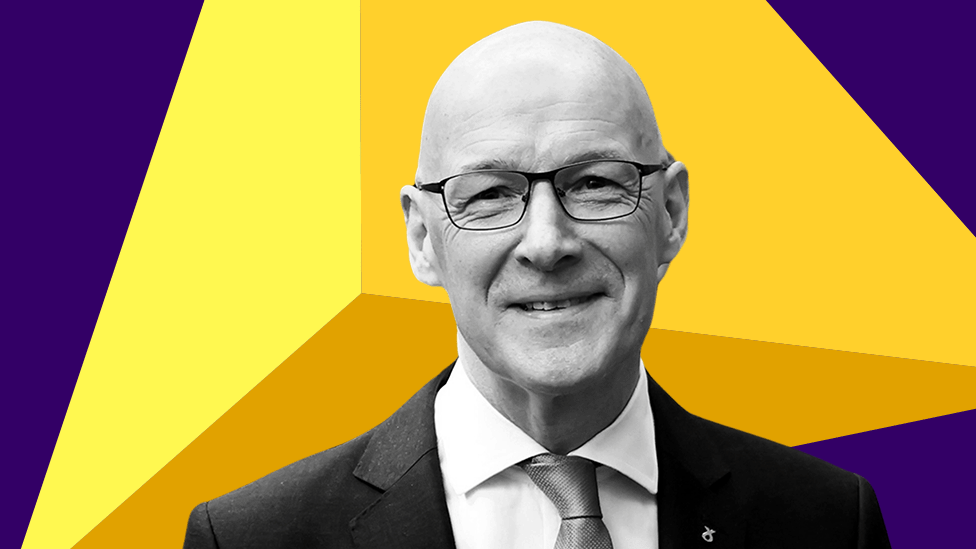Who is SNP leader John Swinney?

- Published
John Swinney: The basics
Age: 60
Education: Forrester High School, University of Edinburgh
Family: Married to BBC Scotland journalist Elizabeth Quigley. The couple have one son. Mr Swinney also has a son and daughter from a previous marriage.
Parliamentary constituency: MSP for Perthshire North in the Scottish Parliament
Who is he?
Scottish first minister and SNP leader John Swinney was born and raised in Edinburgh.
He went to the University of Edinburgh, where he graduated with an degree in politics in 1986.
Before winning the Tayside North seat at Westminster in 1997, Mr Swinney worked at the Scottish Coal Project and spent five years at Scottish Amicable Life Assurance.
He joined the SNP in 1979 aged 15 after a referendum held that year failed to deliver devolution for Scotland.
Mr Swinney was soon running the SNP's youth wing and climbed through senior roles in the national party, becoming its secretary aged 22.
He is Scotland’s longest serving elected parliamentarian.
Newscast leader profiles: John Swinney
- Attribution
What was his route to power?
Mr Swinney believed his days in frontline politics were over until a matter of weeks ago, when an SNP leadership crisis propelled him back to the head of the party.
He previously led the party between 2000 and 2004, succeeding Alex Salmond.
Following disappointing results in the 2003 Scottish Parliament and 2004 European Parliament elections, Mr Swinney stood down.
When the SNP came to power at Holyrood for the first time in 2007, Mr Salmond - by that time back in charge of the SNP - turned to Mr Swinney to be his finance secretary.
He held that post for more than seven years and then became deputy first minister to Nicola Sturgeon.
After a second spell as finance secretary, Mr Swinney served as education secretary and then Covid recovery secretary.
He stood down from government at the same time as Nicola Sturgeon, in March 2023, and had seemingly retired from the frontbenches.
However, following the resignation of Humza Yousaf last month, Mr Swinney began a second stint as SNP leader, citing a sense of "duty" to the party.

What are his key pledges?
The SNP’s key objective is Scottish independence. It also wants:
To eradicate child poverty in Scotland
To rejoin the European Single Market
Investment in the NHS and action on the cost of living crisis
Scotland to reach its target to have net-zero carbon emissions by 2045 while creating economic growth
What state are the SNP in?
The SNP has dominated politics in Scotland in recent years and has formed the Scottish government since coming to power at Holyrood in 2007.
It won 48 of the 59 seats in Scotland in the last general election, and is currently the third-largest party in the House of Commons.
But opinion polls have suggested the SNP could be facing a strong challenge this time around from a resurgent Scottish Labour, which is aiming to displace the nationalists in seats across much of central Scotland.
Mr Swinney only took over the party leadership in May following the sudden resignation of Humza Yousaf as first minister, and would not have expected to find himself embroiled in a general election so soon,
The election is being fought against the backdrop of the ongoing police investigation into the SNP’s funding and finances, which has seen former party chief executive Peter Murrell, the husband of Nicola Sturgeon, arrested and charged with embezzlement.
Mr Swinney has also had to contend with the suspension from parliament of former health secretary Michael Matheson over an £11,000 bill that was racked up on his parliamentary iPad while he was on a family holiday.
He admitted in a BBC interview last week that the SNP is facing a “tough challenge” in the upcoming election, and has attempted to portray himself as being a safe pair of hands that will steady the ship after what has been a turbulent period for the party.
He will be hoping that his message of a vote for the SNP being a vote to “put Scotland’s interests first” and to increase pressure on Westminster to grant a second independence referendum will resonate with the Scottish electorate.
Mr Swinney has also been keen to highlight some of the policies that have been introduced in Scotland by the SNP government over the past 17 years, including free prescriptions, the abolition of university tuition fees, free bus travel for under-22s and the Scottish Child Payment.
BBC News will have a profile on each of the major party leaders running in the 2024 UK general election.